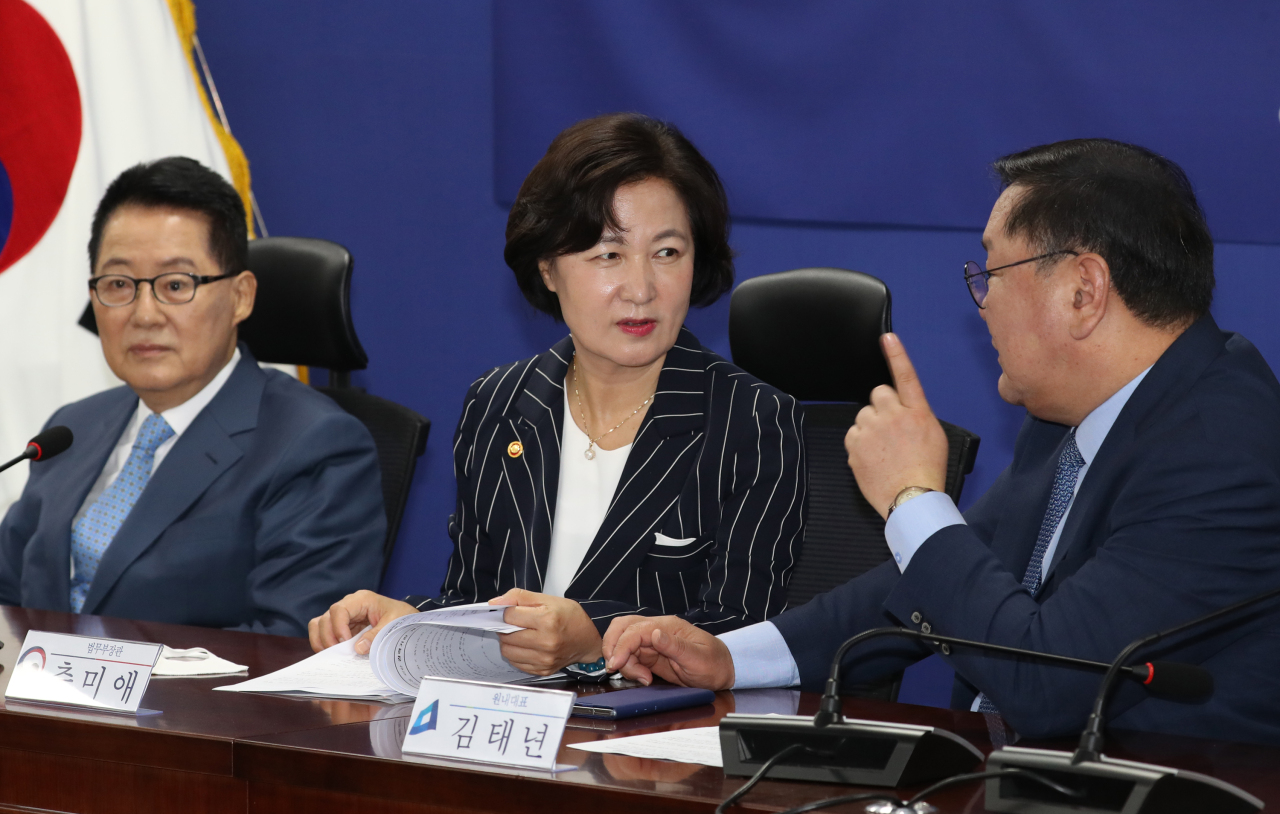Ruling party, government jointly push for powerful agencies revamp
By Park Han-naPublished : July 30, 2020 - 16:19

Cheong Wa Dae, the government and the ruling Democratic Party of Korea announced a reformation plan Thursday that will check and balance the power of investigative and intelligence authorities.
The purpose of the scheme unveiled after their joint meeting at the National Assembly is to “disperse authority that powerful agencies hold and control them in democratic ways.”
“The core is overhauling powerful agencies that have reigned over the people into state institutions that serve the people through checks and balances,” Democratic Party Floor Leader Kim Tae-nyeon said.
The National Intelligence Service will seek to change its name to the External Security and Intelligence Service, roughly translated, and relinquish its investigative function on espionage cases to the police.
Seeking to enhance the transparency of group, it will strictly ban political interference of its agents such as engagement with the National Assembly while open its audit director position to outsiders.
The Democratic Party plans to submit a bill containing the schemes to make revisions to existing law regarding the agency.
The prosecution’s investigative power will be diminished as the scope of crimes that prosecutors can launch a direct investigation into will be limited to six categories – corruption, business, government officials, elections, defense business and major catastrophic accidents.
“We greatly reduced the excessive direct investigation power, which has been pointed out as the prosecution’s problem and dispersed authority that has been concentrated on prosecutors,” Justice Minister Choo Mi-ae said.
Adding momentum to President Moon Jae-in‘s prosecution reform drive, the National Assembly in December and January passed a set of bills aiming to reform the prosecution.
The bills included adjusting investigative rights and establishing an independent anti-corruption investigative agency.
Under the overhaul plan, police will have wider investigative powers for grave crimes and more authority, strengthening its autonomy to have a horizontal relations with the prosecution. So far, prosecutors have played a directive role over police such as granting approval to police to open cases.
Prosecutors and police are obligated to have a prior consultation when facing conflicts in opinion over investigation procedures on important cases.
The ruling party and the government decided to adopt a new self-governing regional-level police system in addition to the existing national police system.
If the new system takes force, police committees under regional cities and provinces will be put in charge of supervising regional-level police forces independently of the national police forces, according to the announcement.
By Park Han-na (hnpark@heraldcorp.com)








![[Graphic News] More Koreans say they plan long-distance trips this year](http://res.heraldm.com/phpwas/restmb_idxmake.php?idx=644&simg=/content/image/2024/04/17/20240417050828_0.gif&u=)
![[KH Explains] Hyundai's full hybrid edge to pay off amid slow transition to pure EVs](http://res.heraldm.com/phpwas/restmb_idxmake.php?idx=644&simg=/content/image/2024/04/18/20240418050645_0.jpg&u=20240419100350)






![[From the Scene] Monks, Buddhists hail return of remains of Buddhas](http://res.heraldm.com/phpwas/restmb_idxmake.php?idx=652&simg=/content/image/2024/04/19/20240419050617_0.jpg&u=20240419175937)

![[KH Explains] Hyundai's full hybrid edge to pay off amid slow transition to pure EVs](http://res.heraldm.com/phpwas/restmb_idxmake.php?idx=652&simg=/content/image/2024/04/18/20240418050645_0.jpg&u=20240419100350)

![[Today’s K-pop] Illit drops debut single remix](http://res.heraldm.com/phpwas/restmb_idxmake.php?idx=642&simg=/content/image/2024/04/19/20240419050612_0.jpg&u=)